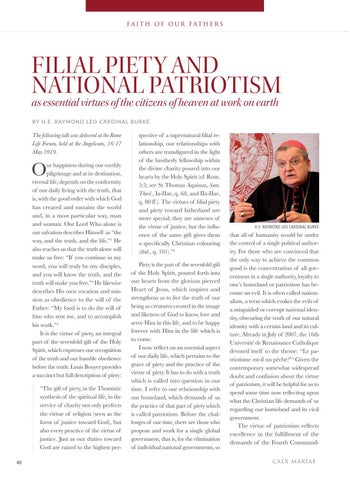F A I T H O F O U R F AT H E R S
FILIAL PIETY AND NATIONAL PATRIOTISM
as essential virtues of the citizens of heaven at work on earth BY H. E . R AY MO N D L EO C A R D IN A L B UR K E
The following talk was delivered at the Rome Life Forum, held at the Angelicum, 16-17 May 2019.
O
ur happiness during our earthly pilgrimage and at its destination, eternal life, depends on the conformity of our daily living with the truth, that is, with the good order with which God has created and sustains the world and, in a most particular way, man and woman. Our Lord Who alone is our salvation describes Himself as “the way, and the truth, and the life.”1 He also teaches us that the truth alone will make us free: “If you continue in my word, you will truly be my disciples, and you will know the truth, and the truth will make you free.”2 He likewise describes His own vocation and mission as obedience to the will of the Father: “My food is to do the will of him who sent me, and to accomplish his work.”3 It is the virtue of piety, an integral part of the sevenfold gift of the Holy Spirit, which expresses our recognition of the truth and our humble obedience before the truth. Louis Bouyer provides a succinct but full description of piety: “The gift of piety, in the Thomistic synthesis of the spiritual life, in the service of charity not only perfects the virtue of religion (seen as the form of justice toward God), but also every practice of the virtue of justice. Just as our duties toward God are raised to the highest per-
40
spective of a supernatural filial relationship, our relationships with others are transfigured in the light of the brotherly fellowship within the divine charity poured into our hearts by the Holy Spirit (cf. Rom. 5:5; see St Thomas Aquinas, Sum. Theol., Ia-IIae, q. 68, and IIa-IIae, q. 80 ff.). The virtues of filial piety and piety toward fatherland are more special; they are annexes of the virtue of justice, but the influence of the same gift gives them a specifically Christian colouring (ibid., q. 101).”4 Piety is the part of the sevenfold gift of the Holy Spirit, poured forth into our hearts from the glorious pierced Heart of Jesus, which inspires and strengthens us to live the truth of our being as creatures created in the image and likeness of God to know, love and serve Him in this life, and to be happy forever with Him in the life which is to come. I now reflect on an essential aspect of our daily life, which pertains to the grace of piety and the practice of the virtue of piety. It has to do with a truth which is called into question in our time. I refer to our relationship with our homeland, which demands of us the practice of that part of piety which is called patriotism. Before the challenges of our time, there are those who propose and work for a single global government, that is, for the elimination of individual national governments, so
H.E. RAYMOND LEO CARDINAL BURKE
that all of humanity would be under the control of a single political authority. For those who are convinced that the only way to achieve the common good is the concentration of all government in a single authority, loyalty to one’s homeland or patriotism has become an evil. It is often called nationalism, a term which evokes the evils of a misguided or corrupt national identity, obscuring the truth of our natural identity with a certain land and its culture. Already in July of 2007, the 16th Université de Renaissance Catholique devoted itself to the theme: “Le patriotisme est-il un péché?”5 Given the contemporary somewhat widespread doubt and confusion about the virtue of patriotism, it will be helpful for us to spend some time now reflecting upon what the Christian life demands of us regarding our homeland and its civil government. The virtue of patriotism reflects excellence in the fulfillment of the demands of the Fourth CommandCAL X M A R IA E










